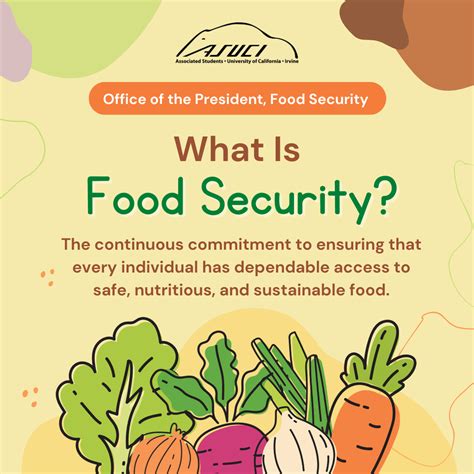Introduction
The world faces an unprecedented challenge in ensuring food security for its growing population. By 2050, the global population is expected to reach 9.7 billion, putting a significant strain on food systems. The sustainable production and consumption of food are critical to addressing this challenge. Sustainable food practices aim to minimize the environmental impact of food production while ensuring its long-term availability and accessibility.

The State of Food Security
According to the Food and Agriculture Organization (FAO), approximately 811 million people were undernourished in 2020. This number is projected to increase in the coming years due to factors such as climate change, population growth, and conflict. Food insecurity is not only a matter of hunger but also of malnutrition, which affects an estimated two billion people worldwide.
Sustainable Food Systems
Sustainable food systems aim to address the challenges of food security by promoting practices that protect the environment, conserve resources, and ensure equitable access to food. Key principles of sustainable food systems include:
- Reducing Food Loss and Waste: Globally, approximately one-third of food produced is lost or wasted. Reducing food waste can significantly increase food availability and reduce environmental impacts.
- Promoting Sustainable Agriculture: Sustainable farming practices such as organic farming, agroforestry, and conservation tillage can reduce environmental degradation and improve soil health.
- Investing in Research and Innovation: Technological advancements, such as precision agriculture and plant breeding, can help increase food yields and adapt to the challenges of climate change.
- Empowering Local Communities: Supporting local food systems and empowering farmers can improve food access and reduce vulnerability to food insecurity.
Strategies for Sustainable Food and Food Security
To achieve sustainable food and food security by 2025, several strategies are essential:
- Policy Reform: Governments must adopt policies that support sustainable food practices, such as subsidies for organic farming and incentives for reducing food waste.
- Consumer Education: Raising consumer awareness about the importance of sustainable food choices can drive demand for environmentally friendly products.
- Collaboration between Stakeholders: Collaboration between farmers, food processors, distributors, and consumers is crucial for creating a sustainable food system.
- International Cooperation: Global cooperation is essential to address issues such as food trade, climate change, and poverty, which impact food security.
Benefits of Sustainable Food Systems
Sustainable food systems offer numerous benefits, including:
- Improved Environmental Health: Reduced food loss and waste, sustainable farming practices, and reduced chemical use contribute to a healthier environment.
- Increased Food Security: Sustainable practices can increase food yields and improve access to food for vulnerable populations.
- Economic Growth: Sustainable food systems can create jobs and stimulate economic growth in rural communities.
- Improved Health and Well-being: Access to nutritious and sustainable food contributes to better health outcomes and reduced healthcare costs.
Challenges to Sustainable Food and Food Security
Despite the potential benefits, there are challenges to achieving sustainable food and food security:
- Climate Change: Climate change is a major threat to food systems, as it can lead to crop failures, droughts, and floods.
- Population Growth: The increasing global population puts pressure on food resources and land use.
- Conflict and Displacement: Conflict and displacement disrupt food systems and make it difficult for people to access food.
- Economic Inequality: Income disparities and unequal access to resources can lead to food insecurity.
Conclusion
Ensuring sustainable food and food security is a complex and urgent challenge. By implementing sustainable food practices, investing in research and innovation, and collaborating across sectors, we can create a food system that supports the health of people and the planet. The race to 2025 is a critical time to take bold action and make the transition to a sustainable and food-secure future.





















